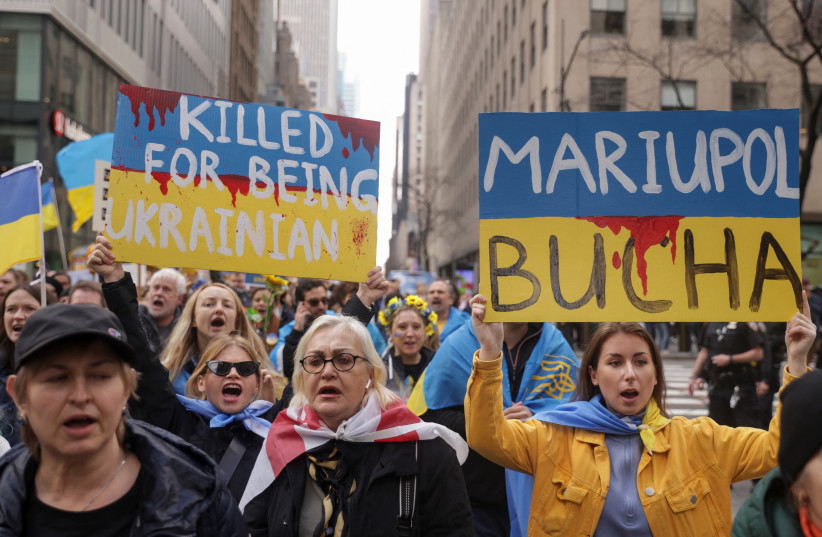Getting facts in real time is difficult while reporting on war. Trying to discern truth from fake news is even more challenging, according to the day-long 5th International Press Conference at the Begin Heritage Center in Jerusalem.
The keynote addresses at the conference, which concentrated on truth and accuracy, were delivered by Julie Pace, executive editor and senior vice president of The Associated Press and former chief reporter at the White House; and Richard Gingras, vice president of news at Google.
Gringas emphasized that “accountability in journalism is critical.” He noted that only 10% of people are “regular consumers of serious news, and fewer pay for it.”
The conference, on Thursday, was jointly hosted and organized by the Union of Journalists of Israel, the Jerusalem Press Club and the Begin Center.
In a panel discussion with Israeli and foreign correspondents who have reported on the war in Ukraine, moderator Dov Gilhar, who primarily hosts news and current affairs programs for KAN 11 and Radio Reshet Bet, said that he was not a war correspondent, but found himself in that position when he was sent to Ukraine to provide backup for Hadas Grinberg, who was reporting from there on a daily basis.

He had never previously worked in a foreign war zone – and it was a painful learning experience.
Grinberg was one of the panelists along with Thomas Grove of The Wall Street Journal, Eldad Beck of Israel Hayom, and Achiya Schatz of Fake Reporter
Headlined ‘Journalism under Fire’ the discussion focused not only on journalists who are risking their lives when reporting from the frontlines of the war, but also on the assault on journalists and journalism, in the effort by the authorities and other parties to prevent the publication of news which the public is entitled to know.
The situation is exacerbated by social media, which is used by the propaganda machines of both Russia and Ukraine to convey disinformation.
Relating to this in her own address some hours later, Pace said: “If you read the Russian coverage of the war, it’s very different from situations on the ground.”
"If you read the Russian coverage of the war, it's very different from situations on the ground."
Executive Editor of AP Julie Pace
One of the dilemmas faced by journalists other than aiming for accuracy, is trying to remain objective. In this war, the general feeling is that the Russians are the bad guys, so there’s often less fact-checking on information provided by the Ukrainians.
Gilhar asked whether journalists should take sides
Beck was disturbed that the international press is being exploited and that some journalists who are biased are ignoring reality.
Gringras said later that “perceptions of reality conflict with actual reality.”
Beck pointed out that officials in both Russia and Ukraine grew up under the Soviet regime, which was notorious for spreading false propaganda. His underlying message was that neither of them should be taken at face value, and that any information they impart be it as a government press release or on social media, should be taken with no more than a grain of salt.
“It’s difficult to decide what’s really happening,” said Grove, because each side has their own narrative and their own truth. “The Ukrainian side is trying to control the narrative,” he said, whereas “on the Russian side, there is a cohesive narrative.”
Commenting that there is a lot of exaggeration in the way the Ukrainians tell their story, Grove reached the conclusion that the only way to get a semblance of the truth was to get as close to the front as possible.
Grinberg said there was a paucity of official briefings, and very often she received her information from people in the street. But here too, there was difficulty in getting to the truth. One of the first journalists to report on the mass grave in Bucha, Grinberg did not find out about it from an official source, but from people she met in the street. Initially she did not believe them, but when she walked on a little further, she met someone else who confirmed the story.
Here again, there were discrepancies. Grinberg gave the number of civilian dead in the mass grave as 67, but in reports by other media outlets, the figures vary. The Russians, who were lambasted for firing at civilians, denied having done so, but the evidence was against them.
Fake Reporter is not exactly what its name suggests. Schatz explained that it researches reports on specific issues, looking for biased content, and in Ukraine, compares both traditional and social media reports as well as official Ukrainian and Russian sources with those of western media outlets.
Long before the present conflict, Russia was coordinating an information campaign around the world, and while making use of western social media platforms, was simultaneously attacking them.
The material disseminated by Russia spelled out its intentions in Ukraine, but no one took any notice till it was too late.
It took two weeks before Facebook and other social media outlets blocked this campaign, said Schatz. The focus of Fake Reporter is not on content, said Schatz, but on the methods used in propagating lies.
Even while knowing that they are being fed false information, journalists have to rely to some extent on what they are being told by official sources, said Grove.
But Beck was worried about how much journalists could publish of what they see and hear. It’s a very problematic situation for journalists who are trying to do their job, while those directing the war are doing everything to prevent journalists from doing their job, he said..
